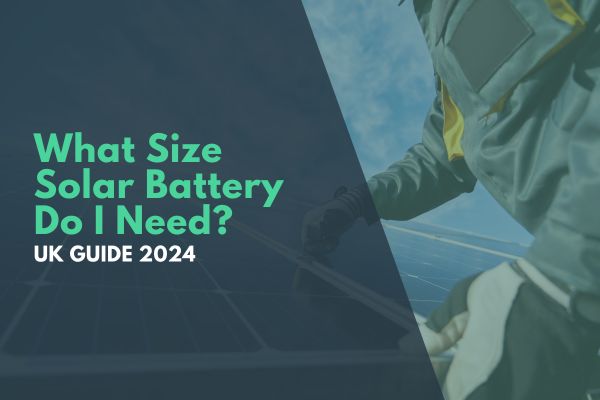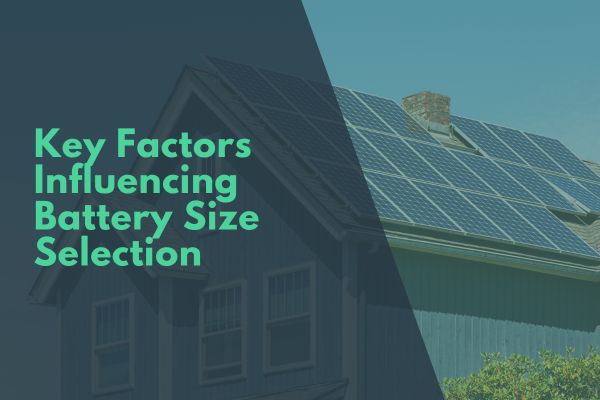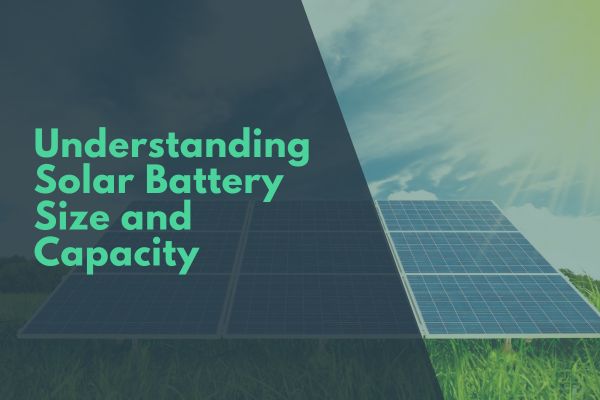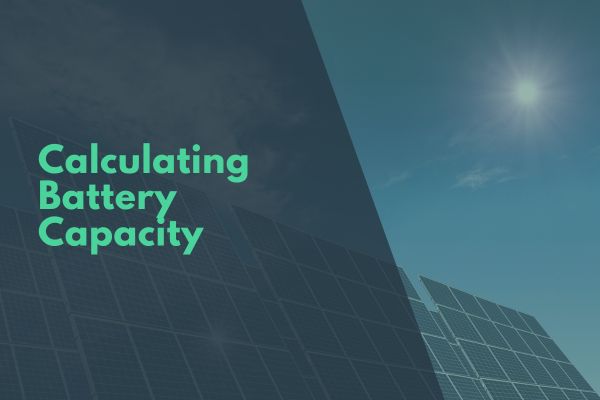

When considering solar power for your home, selecting the right size solar battery is absolutely necessary to ensure you're making the most of your solar panels. It's all about balance; your battery should match your energy usage and the output of your solar array. It's also not just about storing energy; you also need a solar battery that fits your financial goals and maximises available incentives.
Assessing your daily electricity consumption and the capacity of your solar system can inform you about the size of the battery you need. Remember, a correctly sized battery can enhance your energy independence and provide reliability during times when solar energy is not being produced. Here, we'll discuss the nitty-gritty of choosing the most suitable solar battery size for your home—read on!

When picking a solar battery suited to your home energy needs, consider the size and price point, as well as how long it'll last you before needing a replacement. Battery choices vary widely in capacity and price, so you've got options to match both large and smaller energy requirements. Here's an overview of the best batteries by size on the market today:
To make your decision easier, here's a summarised view:
| Battery Type | Size (kWh) | Average Cost | Lifespan (Years) | Cycle Life |
|---|---|---|---|---|
| The Tesla Powerwall 2 | 13.5 | £6,500 - £8,000 | 10 - 15 | Up to 5,000 |
| Puredrive II | 5-25 | £5,000 - £8,000 | 10 - 15 | Up to 10,000 |
| The Plyontech 4.8 | 4.8 | £6,500 - £8,000 | 10 - 15 | Up to 8,000 |
| LG Chem RESU | 3.3 - 13.1 | £3,000 - £7,000 | 10-15 | Up to 6,000 |
| The Sonnen Eco | 5 - 15 | £4,000 - £8,000 | 10 - 15 | 10,000 |
| BYD B-Box | 2.5 - 10 | £1,500 - £6,000 | 10 - 15 | Up to 8,000 |
DISCLAIMER: The provided ranges may not accurately reflect current market prices or regional differences. Prices can fluctuate based on factors like demand, brand, and installer markup.
Remember, your choice depends on how much energy you use and how much you're willing to invest initially. Rather than thinking solely in terms of cost, consider the long-term value and your specific energy demands.

When sizing your solar battery, it’s important to consider your household demands, system specifications, and local climate to optimise energy usage and costs effectively. Let's dive into the specifics:
Here is a guide to help you estimate the suggested battery size for different household sizes:
| Number of Bedrooms | Average Daily Use (kWh) | Suggested Battery Size (kWh) |
|---|---|---|
| 1-2 | 3-5 | 2-4 |
| 3 | 7-9 | 8-10 |
| 4+ | 10+ | 9.5+ |
Below is a breakdown of recommended battery sizes based on your solar PV system's capacity and average output:
| Solar PV Capacity (kW) | Average Output (kWh/day) | Recommended Battery Size (kWh) |
|---|---|---|
| 2-3 | 6-10 | 8-9 |
| 4 | Roughly 8 | 8-9 |
| 5 | Roughly 12-15 | 9.5-10 |
| 6 | 20+ | 12 |
| 8 | Roughly 16-20 | 16 |
| 10 | Roughly 20-25 | 20-21 |
Below is a table illustrating the effect of seasonal sunlight variations on battery sizing:
| Season | Avg. Sunlight Hours | Effect on Battery Sizing |
|---|---|---|
| Summer | 5-6 | Potentially less reliance on battery storage due to higher solar energy production. |
| Winter | 1-2 | May require increased battery capacity to compensate for lower solar energy production. |
Remember, a well-sized solar battery ensures your lights stay on, your energy costs are low, and you make the most out of your renewable investment.

When selecting a solar battery for your home, it's essential to understand your energy usage, battery capacity, and how different factors like depth of discharge affect a battery's lifespan. Here's how to look into each of them:
To provide a clearer and more contextually accurate overview of home energy usage, here's a table that incorporates the daily measurement timeframe:
| Average Daily Electricity Consumption | Estimated Daily Solar PV Output | Potential Daily Surplus Energy for Storage |
|---|---|---|
| 10 kWh | 12 kWh | 2 kWh |
| 15 kWh | 18 kWh | 3 kWh |
| 20 kWh | 25 kWh | 5 kWh |
| 25 kWh | 30 kWh | 5 kWh |
| 30 kWh | 35 kWh | 5 kWh |
However, it's important to remember that actual values can vary significantly based on location, the size of the solar system, and individual household appliance usage patterns.
Understanding the capacity of a solar battery is fundamental to ensuring it meets your energy storage needs. The table below differentiates between total and usable capacity, critical for evaluating how much electricity your battery can realistically store:
| Total Battery Capacity | Usable Capacity (Approx) |
|---|---|
| 5 kWh | 4 kWh |
| 6 kWh | 4.8 kWh |
| 7 kWh | 5.6 kWh |
| 8 kWh | 6.4 kWh |
| 9 kWh | 7.2 kWh |
| 10 kWh | 8 kWh |
| 12 kWh | 9.6 kWh |
| 15 kWh | 12 kWh |
The following table provides insight into how different DoD levels affect battery life:
| Depth of Discharge (DoD) | Estimated Battery Lifespan (Number of Cycles) |
|---|---|
| 90% | ~1,000 cycles |
| 80% | ~1,500 cycles |
| 70% | ~2,200 cycles |
| 60% | ~3,000 cycles |
| 50% | ~4,500 cycles |
| 40% | ~6,000 cycles |
| 30% | ~7,500 cycles |
Using this information, you can choose a solar battery that suits your home's energy needs, maximises your solar system's potential and ensures longevity and efficiency in your energy storage solution.

To determine the necessary capacity for your solar battery system, you need to understand your daily power usage, how many days of backup power you require, and the maximum output your battery can deliver. This information helps in calculating the capacity needed to meet your energy requirements effectively.
The formula to calculate the required battery capacity is:
Batteries needed (Ah) = (Daily consumption (Ah) X Backup days X Correction factor 1.15) / Depth of Discharge (DOD) %
If your system requires 200 Ah daily, with a need for 2 days of backup, and the batteries provide a 50% Depth of Discharge (DOD), the calculation would be:
Batteries needed (Ah) = (200 Ah X 2 X 1.15) / 0.5 = 920 Ah
This means approximately nine 100 Ah batteries are needed for the specified backup duration.

Understanding the financial implications and available incentives is crucial when considering a solar battery. The cost-effectiveness of different battery sizes can be a determining factor in your decision.
| Battery Size (kWh) | Estimated Price (£) | Estimated Savings (£/year) |
|---|---|---|
| Small (1-4 kWh) | £1,500 - £3,000 | £200 - £350 |
| Medium (4-8 kWh) | £3,000 - £6,000 | £350 - £500 |
| Large (8-13 kWh) | £6,000 - £9,000 | £500 - £650 |
This table helps in understanding the potential financial return on different sizes of solar batteries.
In the UK, several schemes can make solar batteries more affordable:
The table below highlights key incentives and their potential benefits, helping you navigate the financial landscape of solar battery installation:
| Incentive | Description | Potential Benefit |
|---|---|---|
| Smart Export Guarantee (SEG) | Payment for surplus solar energy | Offset installation costs |
| Local Grants | Financial support from local authorities | Reduce initial investment |
| Reduction in Energy Bills | Saving on traditional energy costs | Long-term financial saving |
Remember, while incentives can significantly offset costs, they vary based on your location and the specifics of your installation, so always do your homework.
When you're sizing up a solar battery for your system, Reddit's got a wealth of chatter. Users on subreddits like r/solar and r/solarenergy get into the nitty-gritty of what you might need, offering first-hand experiences and quite the variety of opinions. Here's the lowdown:
Here's a table summarising the key points from Reddit:
| Topic | User Insight |
|---|---|
| Battery Size Calculation | '125A x C/8 = 1000Ah 48V bank' - r/solar |
| Daily Energy Needs | '13-16 kWh needed per day' - r/solarenergy |
| Panel to Battery Ratios | 'Minimum 2 100W panels' - r/solar |
Sentiment across these discussions leans on the practical side, with Redditors emphasising real-world usage and actual energy needs. There's a general agreement that one size doesn't fit all, and your solar battery should be tailored to your unique setup.

To pinpoint the right solar battery size, start by checking your daily energy consumption. Then aim for a battery with at least double this usage to ensure you’re covered, especially during less sunny days.
For a 4kW system, work out how much energy you use when the sun's not doing its bit. Let's say it's 4kWh daily. You'll want a battery that can store a day's worth of energy, so look for one with at least 4kWh capacity.
Your 3kW solar panel setup might generate around 12kWh daily. If half of that isn't covered by sunlight, you'll need a battery that can store at least 6kWh to keep the lights on.
Battery size is directly linked to cost – bigger capacity usually means a higher price tag. Compare different models and manufacturers to find the sweet spot between battery size and the investment you're ready to make.
| Solar Battery Size | Cost Range |
|---|---|
| Less than 1 kWh | £230 to £300 |
| 3 kWh | £2,500 to £4,000 |
| 5 kWh | £3,500 to £5,000 |
| 10 kWh | £5,000 to £7,500 |
| 15 kWh | £7,500 to £10,000 |
When choosing your battery storage, think about these points: the capacity needed for your home's energy use, compatibility with your solar panel system, warranty periods and, of course, your budget.
| Consideration | Details to Consider |
|---|---|
| Capacity | Match to home's energy use |
| Compatibility | Must work with your solar panel system |
| Warranty | Longer warranty means better coverage |
| Budget | Know your limit and stick to it |
Solar batteries available in the market today generally have a lifespan ranging from five to 15 years, which means they will likely need to be replaced at least once within the 25 to 30+ year expected lifespan of a solar system. This longevity is considered substantial but requires planning for future replacement to ensure continuous system operation.
For a solar photovoltaic (PV) system of 5 kW with a daily energy consumption of 5-10 kWh, a 4 kWh battery is recommended to maximize returns, while a 35 kWh battery is advised for those looking to maximize energy independence. In cases where daily energy consumption ranges between 11-15 kWh, opting for a 7 kW battery is considered ideal to align with energy needs and system efficiency.
Batteries in solar systems offer the advantage of not needing to wait for the sun to recharge. Once discharged, these batteries can be recharged overnight using cheaper, off-peak grid electricity. This strategy allows for the stored energy to be used in the morning, effectively offsetting the more costly on-peak power rates and thus leading to cost savings.
The capacity of a battery to store charge is indicated by its ampere-hour (Ah) rating, with a higher Ah rating signifying a larger capacity. However, a battery's power output, which depends on its ability to deliver voltage and current, is not solely determined by its Ah rating. This distinction underscores the importance of considering both capacity and power output when selecting a battery for specific energy needs.